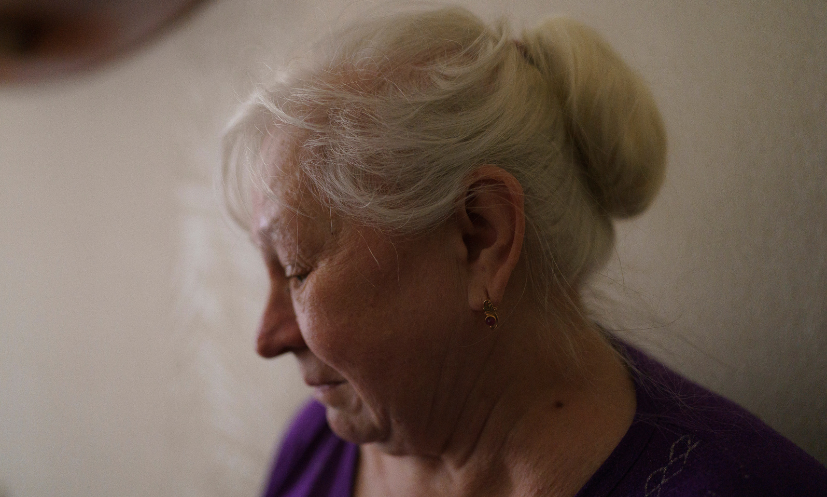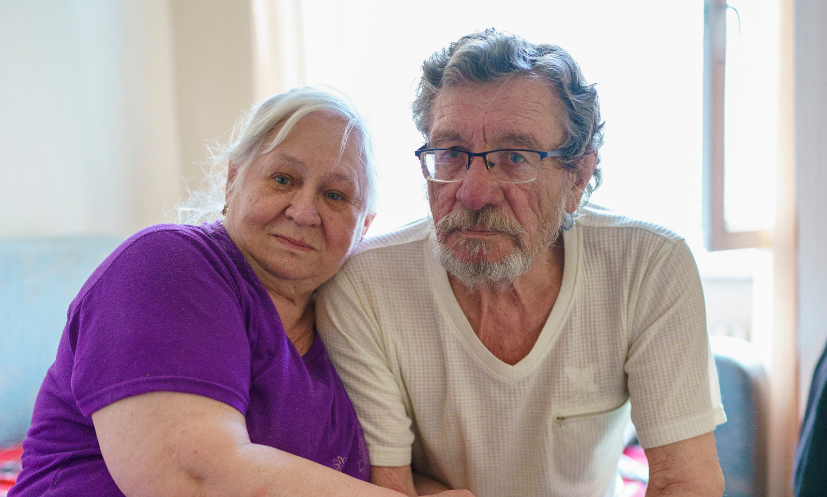Ukraine conflict: Younger people ran from the shelling – we couldn’t

Ukraine is the world’s oldest humanitarian crisis, with the largest percentage of older people affected by a conflict in a single country anywhere in the world. Age and disability can make sheltering from the shelling harder, but leaving means having the strength to begin again and leave behind a lifetime of memories and belongings.
Raisa and her husband Alexander, both in their seventies, had to make that difficult decision when they were evacuated from their home in Severodonestk with the help of volunteers.
Severodonetsk is in Eastern Ukraine and was affected by the initial outbreak of conflict in 2014, but Raisa told us that things became far worse this year.
“There was shelling then, but we didn’t expect something as bad as this to happen. A lot of houses, schools and hospitals have been destroyed.”
Raisa and her husband met at university and have been together for 52 years. Before the conflict worsened, they had hoped and expected to be able to have a comfortable retirement.
“We reached retirement and we thought it was time to enjoy our lives together... The children and even grandchildren are grown now. We had a washing machine, a nice heating system, a TV. It seems that it's not possible now, everything is gone.”
Raisa told us that after Russian forces advanced into Ukraine, their apartment building was hit by shelling several times as they hid in the corridor. The buildings next door and across the road were also damaged and she lived in constant fear of being hit by shelling. This fear has stayed with her, even now they are safe in Dnipro.
“…Whenever I hear the rumble of the tram I instinctively duck for safety.”
For older people living in conflict-affected regions, escaping the danger isn’t easy – and not everyone is willing and able to leave their homes when the opportunity to evacuate arises.
“We spent all the time in the corridor of our apartment because the basement is down a set of stairs and I have a back problem. Younger people could run down and hide whenever there was shelling, but I was not ready for those runs. We could have stayed in the basement all the time, but it was cold and damp down there. I couldn't take it.
“I walk with a stick these days because of my age – I should have worked less. I would tend to the summer garden and carry children and grandchildren. Alexander also has a heart problem.
“When we were evacuated, an older man in our building was the only one to stay. We have no connection with him, and we don’t know what happened to him.”
Many who evacuated were only able to take the belongings they had to hand or could easily carry. Raisa and Alexander were only able to take their two pet cats, and the clothes they were wearing.
“I tell my granddaughter that we are like beggars now and she says it’s not true, but our neighbours gave us pillows and blankets - they gave us these stools. Nothing belongs to us here. I cry every day because I want to go back home.”
It’s also difficult for those living in conflict-affected regions or uprooted and displaced from their homes to be able to claim their pension or access government support.
“I receive 3,100 (£89) hryvnia a month pension, but I have not been paid since March. We pay 5,000 hryvnia a month now for this small apartment and 10,500 when we moved in. We had to borrow the money from someone, so we will have to pay it back somehow.”
As well as supporting older people at home in the conflict-affected regions, Age International is supporting older people who like Raisa and Alexander have been displaced from their homes, ensuring they get what they need – whether that is hot meals or financial support. But it’s not yet clear what the future holds for older people like them.
“War is scary. War destroys families. But I think young people take it much easier. The younger ones still have time to make money and create something. But this is our last stop, I would say.”

Ukraine Humanitarian Appeal
Age International has been working in Ukraine since 2014, and uniquely positioned to deliver a widescale emergency response to the crisis. We're delivering aid to older people and those who need it the most inside Ukraine and to those who have been able to flee to neighbouring countries.
 Follow us on social media
Follow us on social media
Check out our social media platforms for the latest updates.
